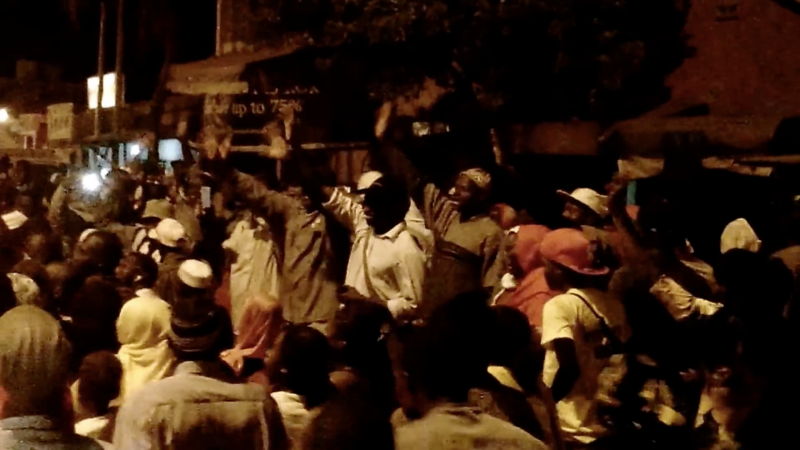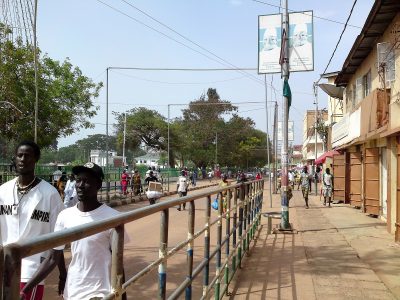
Protesters in the Gambia following the election of Adama Barrow in 2017. Screenshot from YouTube video, widely circulated.
The Advox Netizen Report offers an international snapshot of challenges, victories, and emerging trends in Internet rights around the world.
The Supreme Court in the Gambia struck down the 2013 Information and Communication Amendment (ICA) Act, declaring it unconstitutional. The court nevertheless upheld key sections of the country’s sedition law. Both have been used as tools for media repression.
The ruling is the result of a 2015 court filing by the Gambia Press Union challenging the constitutionality of sedition, libel, criminal defamation, and false news laws. The regional court of the Economic Community of West African States recently ruled on the same laws, in a case brought by four exiled Gambian journalists, and found them all unconstitutional.
But the Gambian Supreme Court thought differently. The ruling upheld sedition laws that can be used to punish critical speech or journalistic investigations related to the president, while it struck down the a 2013 amendment to the ICA, which criminalized online defamation and the spread of “false news” on the internet. Violators were subject to heavy fines and prison terms of up to 15 years in prison.
On Twitter, Gambian journalist Sanna Camara described the ICT Act as one of the “toughest internet laws in Africa.” Camara himself faced legal threats in the Gambia for his coverage of human trafficking, published by The Standard. In 2014, Camara was accused of publishing “false news” and fled the country shortly thereafter.
The Committee to Protect Journalists’ Angela Quintal described the decision as “one step forward, two steps backwards.”
“[The ruling] sends a message that journalists are still not free to work without the threat of criminal prosecution,” she said.
The ruling marks the court’s first major decision affecting free speech since the 2017 transition of power from long-time ruler Yahya Jammeh to current president Adama Barrow. Shortly after assuming office, Barrow freed hundreds of prisoners and launched a series of investigations into alleged human rights violations under the Jammeh regime. But activists and citizens who speak their minds in public spaces online and off have continued to do so under pressure.
In February 2018, a university lecturer was detained over comments he made to a local media outlet. Just this past week, youth activists were arrested after calling attention to the threat of environmental degradation caused by Golden Lead, a Chinese-owned fish processing factory in the coastal settlement of Gunjur.
Tanzanian court puts ‘blogger tax’ on hold, for now
A Tanzanian High Court has halted the implementation of the US $900 “blogger tax” imposed by the government as part of the Electronic and Postal Communications (Online Content) Regulations which demanded that bloggers paid a fine or cease blogging.
Six human right groups in the country had asked the court to review the regulations, arguing that the Minister of Information acted outside his authority and in violation of the right to freedom of expression. Though temporary, the high court ruling is a win for free speech in Tanzania.
Honduran journalist followed after receiving death threats on Facebook
Honduran broadcast journalist Mauricio Ortega received a death threat over Facebook messenger, not long after conducting a series of reports on incidents of passengers being physically assaulted on public transport. Later that day, he was followed by a car with no license plates. In an interview with the Honduran Committee for Free Expression, he said:
…las amenazas en contra de nosotros es lamentablemente hasta normal, estamos acostumbrados a que los que se sienten ofendidos nos insulten, amenacen y nos desacrediten y tristemente no hay confianza ni eficiencia en los entes encargados de administrar o impartir justicia, esto nos vuelve más vulnerables.
…threats against us have unfortunately become normal, we’re accustomed to being insulted, threatened and discredited by those who take offense at our work. And sadly, there is little trust or efficiency in those who are supposed to ensure justice, which leaves us that much more vulnerable.
Mobile networks falter as Russians protest Putin’s inauguration
As protests broke out across Russia, approaching Vladimir Putin's official inauguration into his fourth term as president, several activists reported that their mobile phone signals became weak or non-existent. Some said Russian telecom operators were intentionally degrading the quality of service or even delisting their numbers at the orders of the authorities. Activist Denis Styazhkin reported that his telco operator, Beeline, told him that his number had been de-listed on police orders.
China’s censors have their eyes on Peppa Pig
A Chinese internet subculture connecting the TV cartoon character “Peppa Pig” with “Shehuiren”, a term that refers to organized crime syndicates, has resulted in a muddy puddle for the popular porker. After leading state media outlets criticized the inkage, the popular Chinese video platform Douyan removed more than 30,000 videos of the cheerful pink character and made the term “Peppa Pig” unsearchable on its website, likely anticipating an all-out ban on Peppa.
Egyptian legislators move to monitor Uber rides
On May 7, Egypt’s parliament passed a law that will require ride-hailing services like Uber and the UAE-based Careem to establish servers in Egypt for the processing of all data pertaining to Egypt-based users. The law, which is still awaiting executive approval, obligates these companies to provide user data (including information about the location of both riders and drivers) to security authorities at their request. Both companies were temporarily suspended in March 2018 after a group of local taxi operators sued the companies on licensing grounds.
Will biometric ID cards become mandatory in Europe?
The European Commission proposed new counterterrorism measures including the mandatory inclusion of biometric data in ID cards and residence documents for EU residents and their family members. This measure would require the majority of EU residents to be fingerprinted so that biometric identifiers can be checked at border points.
One voter got Cambridge Analytica to hand over his data. What about the rest of us?
The UK Information Commissioner’s Office has given Cambridge Analytica 30 days to hand over all the data and personal information it has on one American voter, or face a criminal prosecution. The voter, David Carroll, found that because Cambridge Analytica had processed US voter data in the UK, he could assert his rights under British laws. Cambridge Analytica announced this week that it has gone into liquidation.
Declaration from World Press Freedom Day
Participants at the UNESCO World Press Freedom Day International Conference released the Accra Declaration calling on UNESCO member states to create and strengthen legal and policy frameworks to ensure respect for free expression and privacy and to protect safety of journalists and media workers.
New Research
- Hate Speech Laws in India – Centre for Communication Governance, National Law University, Delhi
- So this is democracy? State of media freedom in Southern Africa 2017 – Media Institute of Southern Africa
Subscribe to the Netizen Report
Afef Abrougui, Ellery Roberts Biddle, Nwachukwu Egbunike, Mohamed ElGohary, Rohith Jyothish, Demba Kandeh, Leila Nachawati, and Sarah Myers West contributed to this report.


